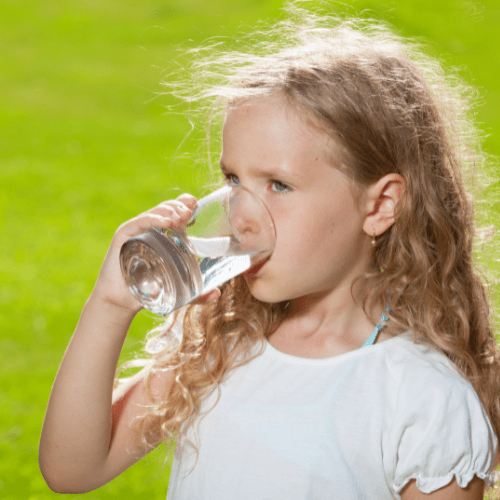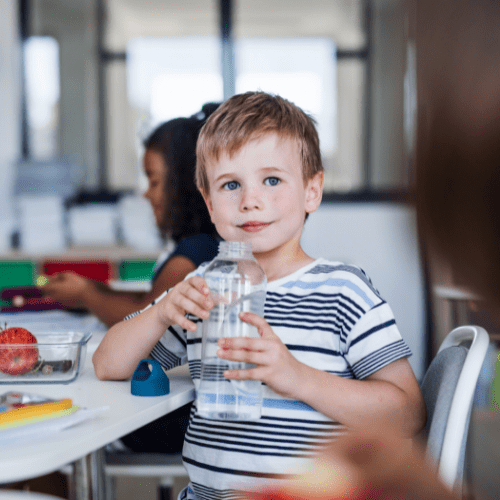Nutrition and Hydration Week was first held in 2012 with the aim of highlighting and educating people about the role of food and drinks in maintaining health and wellbeing.
At Bladder & Bowel UK we are frequently asked questions about the role of water for children with bladder and/or bowel conditions, as well as how to encourage reluctant children to drink the right amount of water for their age, size and activity levels. We have written and are publishing this blog to help professionals, children, young people and families as part of Nutrition and Hydration Week 2021.
Encouraging children to drink more water
Adequate fluid intake is important for maintaining health and wellbeing. There is guidance for how much water children of different ages and genders should be drinking.
Suggested intake of water-based drinks per 24 hours by age and gender
(Adapted from CG 111 Nocturnal Enuresis NICE 2010 and American dietary requirements, cited in CG 99 Constipation in Children and Young People, NICE 2010).
Children will need more than this if they are physically active, if the weather or classroom is hot, or if they are overweight.
However, many parents complain that their children are reluctant to drink and say they do not feel thirsty, or they refuse to drink water. Not drinking enough can cause or exacerbate constipation and bladder problems including urinary tract infections, day and night time wetting, as well as being the reason for headaches, feeling tired and struggling to concentrate.
What type of fluids should my child be drinking?
Water is the best drink, as it does not contain any sugar or other additives. However, some children refuse to drink water. If this is the case for your child, you could try the following:
- Offer them water from the fridge or add ice cubes to it
- Use very dilute sugar-free fruit squashes as an alternative
There are also some things that are not advised. These include:
- Not offering your child fizzy drinks as an alternative to water, except as a rare treat. Fizzy drinks can irritate the bladder lining. This may make your child need to rush to get to the toilet or they may need to go to the toilet more often than is usual.
- Avoid giving your child drinks with caffeine in them. Caffeine can also irritate the bladder causing the same issues as fizzy drinks – having to get to the toilet in a hurry and needing to go more frequently than is usual.
- Not letting your child have more than 500mls (one pint) of milk per day. While milk is healthy, the body uses it more as a food than as a drink. Additionally, too much milk can exacerbate or cause constipation and may contribute to excessive weight gain.
How can I encourage my child to drink more water-based drinks?

Encouraging children to drink may be difficult, especially if they do not feel thirsty. However, thirst is quite a late sign of needing fluids, so children should be drinking regularly. They should have about six to eight drinks spread evenly throughout the day. They should be having about half of their drinks during the school day.
Things that may encourage them to drink more include:
- Build drink times into your family’s routine.
- Make drink times fun: sitting together with a book or game and only read the next page or have your turn at the game when your child has had a few more sips. If your child refuses to drink then put away the book or game until the next drink time.
- Let your child chose their glass, cup or straw. Novelty straws work well for some children.
- You could offer them ice cubes or add slices of fruit to water.
- Start by expecting your child to drink only slightly more than they currently are and then gradually increase the amount you expect them to have until they are having about 1.5litres per day.
- Some children manage better if given half a glass and told to drink it all; others do better if given a full glass and are asked to drink half of it.
- Measure out your child’s water into a clean jug or plastic bottle each day, so they can see what they should be drinking. Pour all their drinks from that so they can see how well they are doing and offer them a small reward if they manage to drink it all.
- Ice lollies and jellies have high water content, but try to chose ones that are sugar-free.
- Do not have battles over drinks.
How can I encourage my child to drink more when at school?

There is information about bladder and bowel issues in nurseries, schools and colleges on the Bladder & Bowel UK website at https://www.bbuk.org.uk/wp-content/uploads/2021/01/Managing-Continence-Problems-in-Schools-2019-.pdf. This includes information for schools on why it is important for children to be drinking well during the school day.
Other things that may help include:
- Ensure your child always has a sports bottle of water for school each day. Make sure they bring the bottle home at the end of the day and offer them a small reward for drinking most or all of it.
- If your child enjoys cold drinks, almost fill the water bottle and put it in the freezer overnight. The water will stay cold as it melts at school the next day.
- Ask the teacher to build drink times into the day, or to allow the children to have their water bottles on their desks.
- Ask the teacher to allow the children to have their water bottles on their desks whenever possible and to use the toilet when they need to. If your child thinks they will not be allowed to go to the toilet, they might not drink at school.
- Encourage secondary age children to drink when moving between classrooms, unless this is not allowed in their school.
Other things to consider
Do not encourage your child to drink in the hour before they go to bed as this may cause bedwetting or make it worse. If your child has a bladder or bowel problem, making sure they drink the right amount during the day can help (see the chart above). A good fluid intake can also help when toilet training.
Where can I get further advice or support?
If you are worried that your child may have constipation, or if they have day or night time wetting, if they are struggling with toilet training, or you have any other concerns about their health speak to their GP, school nurse or health visitor for more advice.
There is also lots of information about bladder and bowel conditions in children on the Bladder & Bowel UK website on the Children Resources page.
Bladder & Bowel UK also offer a free confidential helpline for anyone affected by bladder and bowel issues. Contact us via our enquiries web form and a member of the team will be in touch.


Comments are closed